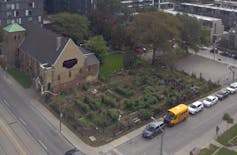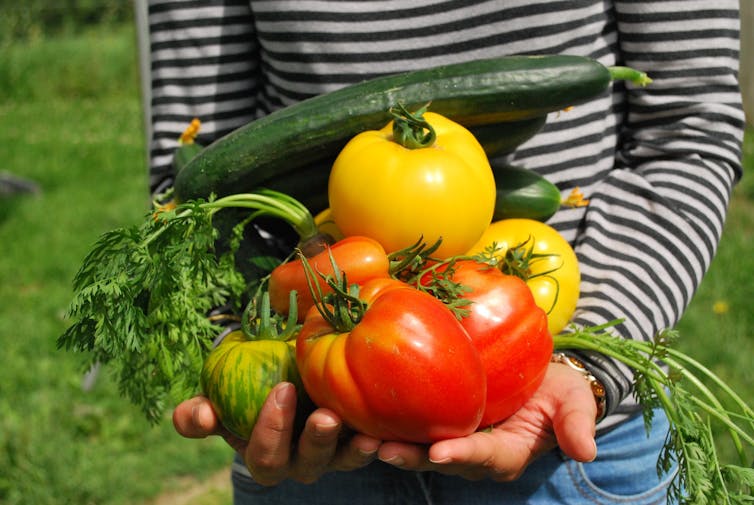It is backyard garden time, which usually means gardeners are starting to appreciate their homegrown vegetables. Having said that, for those people who live in cities, city everyday living can boost the idea that gardens are a bonus, possibly a passion, but not a necessity of existence.
In the early days of the COVID-19 pandemic, supermarkets were being kept open up because of the key position they engage in in feeding us. But the Ontario authorities initially shut down neighborhood gardens, ignoring that gardens also feed us. The gardens have been only opened once again following community stress.
As community overall health researchers with a longstanding curiosity in meals methods and overall health, we’ve identified that, opposite to the strategy of gardening as a interest, gardens are essential to life.
We arrived to this summary based mostly on interviews with diverse gardeners in Toronto, a survey of extra than 100 people and extensive participant observation — which in this case intended gardening alongside one another. Analyze members included garden gardeners, neighborhood plot gardeners, rooftop gardeners and even individuals tending to foodstuff-developing plants inside their apartment. Our conclusions are published in the peer-reviewed journal, Food items, Society & Modern society.
Growing food stuff in the town

(Sarah Elton), Writer delivered
To grow food, you have to be fully commited. There is the weeding and watering, and dealing with squirrels and raccoons who might get to the foodstuff initial.
You have to devote in seeds and equipment and there could be a rate paid to the city for accessibility to an allotment plot if you really do not have area of your possess. If the back garden you tend isn’t in the vicinity of where by you are living, you also have to think about transportation time. And soon after all that, the crop may well are unsuccessful.
Although rates are growing, create is sufficient in grocery outlets. So to superior have an understanding of the part of gardening in the metropolis, we asked why do people do it in the 1st put?
The most common response was that gardening was perceived to enhance health and fitness. Just one retired employee summed it up very well:
“In wintertime, it’s vital to do much more workouts. But summertime, if I skip the gym, I do not sense lousy because I am performing far more.”
Others observed that gardening supported their psychological overall health. They felt calm with the crops, their intellect alert. In some cases, the gardens gave participants a reason to wake up in the early morning at moments when they were going through mental wellness challenges.
To many men and women, the plants have been even found to provide companionship. “I’m living a balanced daily life mainly because of my backyard,” claimed one participant. Gardening contributed to their contentment.
Food items and food stability
Another explanation why people today explained to us they gardened was, not surprisingly, for meals. Most gardeners grew a broad range of meals-manufacturing crops, with 31 per cent of respondents to the survey reporting that they grew as several as 10 to 20 distinctive types.
Importantly, various of the gardeners who offered interviews and who also determined as very low-income, stressed the value of gardening to their food items security. One gardener, who has a modest plot on church-owned land, told us she grew so much food that she didn’t have to go to the grocery store in the summer time, and that assisted with her family’s finances.

(Pixabay)
An additional gardener reported he was equipped to make a considerable contribution to his family by developing ample greens on his allotment plot to not only eat in the summer but to freeze for winter. And a person girl grew the natural and organic food she couldn’t manage at the retailer.
People not only retained this food for by themselves, but they shared it with friends and family members.
Cultural connection
For gardeners who have cultural ties to other countries, some of whom are newer immigrants, escalating their very own food is a way to be certain accessibility to the forms of vegetables they grew up feeding on.
“We left but we nonetheless want the taste,” one particular male claimed of why he grows a kind of spinach from South Asia. At the shop, these vegetables — if they are obtainable — are pricey and aren’t as fresh new.
Our results replicate what other researchers have observed about the cultural, overall health and foodstuff stability benefits of gardens.
Gardening and urban wellness
So if growing food stuff in gardens in the metropolis is central to well being, food stuff stability and tradition, how could possibly policymakers imagine about gardening in different ways?
We argue that gardens should really be deemed necessary pieces of our food items program. Gardens are essential to the people today who have a tendency to them — and also to the quite a few persons whose names are on waiting lists for place to mature foodstuff in the metropolis, who could not have house of their very own.
In our survey, persons who owned their houses had been far more very likely to report that they’d been escalating food stuff for a lot more than 10 a long time. Homeownership typically involves outside area in the form of a property or balcony, which many others may not have obtain to. The pandemic reminded us how several of our eco-social methods are inequitable and fragile, and other researchers have documented how individuals turned to gardens at this time.
A variety of amounts of authorities and other institutions with jurisdiction around land (this sort of as those that oversee hydro corridors as nicely as colleges, spiritual institutions, apartment and condominium land entrepreneurs) should just take motion to broaden safe accessibility to backyard garden space, in individual for persons who do not have a yard.
We should really be investing a lot more in publicly accessible gardens as an vital aspect of our meals procedure.

